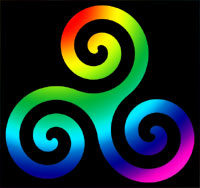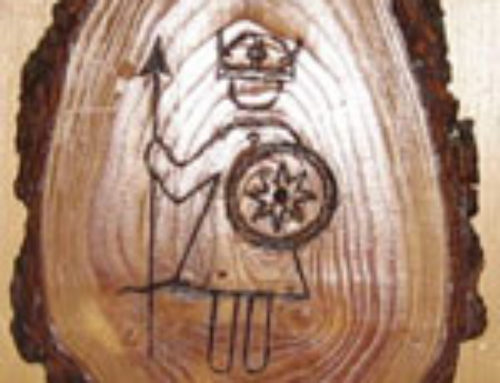Introduction to the Pagan Section : What is a Pagan?
A Pagan is someone who practices one of the Native European religions. But why did these religions disappear?
A Brief History of Monotheism
- One God to rule them all, One God to find them,
- One God to bring them all, and in the lightness bind them.
The idea that a single god would be suitable for every person on Earth is a bit of an anomaly. Just about every native religion on Earth had sophisticated religions with many gods, each with Their own functions. Even the tribes of Israel had a whole pantheon of gods.
Yahweh had a wife, Asherah, Queen of Heaven and Earth. Ilu was the name of the overgod, (which became “El” in Hebrew and “Allah” in Arabic), Attaru was god of fertility, Hadadu the storm god, Samsu the Sun goddess and Warihu the moon god. For some reason, the priesthood of El decided that only their god, the father god, should be honored, and they managed to suppress worship of the other gods.
The hardest to get rid of was Asherah, the Great Mother Goddess, and many bliblical books complain about it. I’m sure Her priestesses weren’t thrilled either. Their temples were burned, and they were forced to either renounce their goddess, or be dead.
Deuteronomy 16:21, “Do not set up any [wooden] Asherah [pole] beside the altar you build to the Lord your God” and “You shall not plant any tree as an Asherah beside the altar of the Lord your God which you shall make”.
This whole idea of One God For Everyone wasn’t really that popular either. It wasn’t until the Roman Emperor Constantine converted to Christianity that it really got going. He used the Roman Empire to support the spread of Christianity, and in 380 A.D., it became the official religion of the Roman Empire. In 385, the first person was convicted and sentenced to death for heresy. Thus came the new era of Christianity, not one of brotherly love, as Jesus had promoted, but of Death To All Unbelievers, enforced by the armies of the Roman Empire. Be a Christian, or be dead. Your choice.
In 610 A.D., the prophet Mohammed had a vision. After that, he and his followers started conquering and converting the neigboring tribes, until pretty much everyone was either Muslim or dead. Are you starting to see a theme developing here?
Pagan Wars ?
As far as I am aware, there has never been any sort of war where a polytheistic religion (one which believes in many gods) tried to force itself onto others. There would be no point. Different gods are good for different things, and why would you want the god of your tribe to protect the rival tribe or kingdom across the river?
The Romans were possiblly the worst offenders in this, with an “Our Way or the Highway” attitude. They got rid of the Druids, because these were the only ones who could organize the Celts to rebel against the Roman occupation. It was a military move, not a religious one. And they persecuted the Christians because these were considered dangerous revolutionaries, a threat to the state.
To escape the lions, all the Christians had to do was make a token offering of incense to Jupiter, to show they were at least willing to play ball and respect the local gods. That these Christians weren’t even willing to do that meant that they were clearly dangerous fanatics bent on overthrowing Roman civilisation. Which, if you think about it, they were. And they did.
What is a Pagan?
The word Pagan comes from the latin “pagani”, which means country dweller. When European Kings converted to Christianity, often for political reasons, they enacted laws that forced their citizens to become Christians too. Well, you had the choice, become a Christian, or become dead. Most chose Christianity. Iceland was the last country to fall to the new religion, being forced to do so by a trade embargo from all the northern countries, as well as with bribes. They live on a rock with few natural resources, they had little choice. And yes, even the bribes are well documented.
It was harder to enforce the law outside the big cities though, so the far off villages still practiced some of their Native European religions. They were mocked as being backwards, slow-witted “hicks”, hence, pagans. They were also unfashionable.
Do you remember seeing medieval princesses wearing cone hats with veils in the movies? Well, just like now, fashions got started by the upper classes, and slowly spread to the masses. By the time witches were represented with pointy hats, those had gone out of fashion with the nobility. It was a way of showing how out of touch with the times these pagans were, like showing old hippies wearing bell bottom pants.
When the witch burnings started, most of these so called witches actually practiced very little of the old religions, and thought they were Christians. The Inquisition was also very profitable for the Church. Anyone accused would be tortured until they confessed, then executed, their money and lands confiscated by the Church. Not terribly romantic, is it? Personally, I have great respect for the God of the 13 Tribes of Israel, Jesus, the Christian God and Allah (who may or may not be the same God). They just aren’t my gods, and I’m not overly fond of some of Their fan clubs either. I get along better with the gods and goddesses of my own ancestors.
So what do you do as a Pagan?
Well, the Church was pretty thorough in destroying Native European religions, just like it was with Native American religions, it’s just that it was done a thousand years ago or more. What little we have left was written down mostly by Christian monks, often deformed and misremembered. We also have folk tales where gods are remembered as human heroes. Like other Pagans, what I practice is reconstructed based on that, and it’s still a work in progress, an organically growing and changing group of religions. If you want to get picky, the old time Pagans would be called Paleo-Pagans, and the new modern kind are often called Neo-Pagans.
Primarily, I honor the Norse gods and goddesses, nature spirits and ancestors.
I’ve been a member of ADF, A Druid Fellowship for about 20 years, and was Senior Druid of Silver Fox Grove, ADF, for 9 years (ADF includes all Indo-European traditions, so Norse is fine). I don’t call myself Heathen or Asatru, as those names generally imply strictly following the lore, and a focus on the Aesir gods. Like most Neo-Pagans, my introduction to Native European spirituality was through Wicca (Neo-Pagan Witchcraft), the most popular form of Paganism today.
I call myself a Northern Tradition Pagan (or sometimes Norse Pagan). Our primary sources are the Gods themselves, and the lore is a guide to finding and communicating with Them. If you want to read more about the differences, you can read this offsite FAQ on Heathenry vs. Northern-Tradition Paganism. You can find the ADF website here. Yes, we speak to the gods. It’s called prayer. But, we also listen, and sometimes, the gods answer.
Spirit Work and Shamanism
I also call myself a spirit worker, which means I serve the spirits. This involves using shamanic, divinatory, magical and trance techniques. I am NOT a shaman. If you read up on stories of traditional shamans, rather than the New Age version of them, you’ll see that becoming a shaman means being chosen by the spirits, suffering years of spirit-sickness, near-death or actual death (or sometimes madness instead), and a lifetime of indentured servitude to the spirits after recovering from this spirit-sickness.
Those who survive the process (and not everyone does) are to be respected, but not envied. Spirit workers can still have a life, they have choices. Shamans don’t, but then, they do get a really strong connection to the Gods and spirits they serve, and fairly clear directions about what they’re supposed to do. You can read what one NT shaman has to say about it here. And by the way, “shaman” is a word that comes from Siberia. It was chosen by anthropologists to describe similar practices from all over the world. It’s not a Native American word.
Shamanism is fairly popular in New Age circles these days, thanks to Michael Harner, who popularized a culturally neutral practice called “core shamanism”. Mostly, it works with animal spirits (“Power Animals”), rather than gods and ancestors, and lets you have spirit helpers without much of a commitment to service. A lot of people who do this really treat it more as a form of psychoChangework, working with archetypes for self-empowerment, rather than working with actual spirits who exist outside of themselves.
As far as it goes, it’s fairly safe, and relatively unlikely to get you into trouble. You don’t need to center your life around the practice to get some benefits. But then again, the spirits won’t take you very seriously if you don’t treat them very seriously. You only get as much out of your spirituality as you put in.
Okay, but what do you actually DO?? Call spirits? Cast Spells?
Energy Magic, Divination and Spirit Magic
Let’s start with a few definitions…
Energy magic involves using your own spiritual energies and imagination to shape reality outside yourself. It’s pretty much the most popular form of magic these days. If I said, “Imagine a cloud of the white light of Goodness filling the room, keeping in the good feelings and positive energies, and keeping out everything harmful,” and you did that, you’d be doing energy magic. In this case, a warding spell. It’s not that hard, and it’s very similar to prayer, except you don’t necessarily need to call for a deity’s help. Why ask for help if you can do it yourself? You don’t call your mother to tuck you in every night anymore, do you? If you instead “Imagine the clouds parting, and the healing light of the Sun beaming down healing energies upon you,” then you’d be doing a healing spell. Spells are more effective with practice, good focus, and some people have more of a knack for it than others.
Energy magic is very useful, but it’s a bit lonely by itself. Gathering lots of power doesn’t help you learn to use it wisely, or be happier either. Just because your spells work doesn’t mean they work the way you intended, and getting what you wished for is often the worst thing that could happen to you. It’s given me lots of really amusing stories though.
Divination is any spiritual method for gathering information. The simplest of these is to ask your intuition a question, and take the first answer it gives, without trying to rationalize it. It gets better with practice, like anything else. The hardest part it putting aside your intellect, and learning to trust your intuition. Honestly, I can’t say my intuition has ever been wrong, but I don’t always think to check it. The most common application I make of it is asking if the food has gone bad before I eat it.
Spirit magic involves developing relationships with spirits who can help you out, and who you are useful to as well. Who serves whom depends on how big the spirit in question is compared to you. Basically, you have Big Friends and Little Friends. Both require time, energy and loving, just like any other relationship does. Some friends are basicallly peers to you, and it’s a give and take.
Big Friends are good for getting guidance, helping you find your path and purpose in life, and occasionally saving your ass when you get in Big Trouble. It’s better to make offerings and devotions to them than to pray for help all the time, because asking a lot means you get into spiritual debt. Eventually, you’ll have to pay up, nothing comes for free. Little Friends need to be taken care of and fed, kind of like pets. Sure, you can force them to do what you want, but what’s the point of that? Better to have a dog that guards your house because it loves you than because it’s chained to the door. Eventually, you die, and all those spirits you’ve pissed off can come back and take a shot at you. On the other hand, if you have a lot of Big and Small Friends, you’ll have allies on the other side when you cross over.
Prayer, lighting candles, and reading sacred texts, are all forms of spirit magic, shared by pretty much every religion.
What is this UPG acronym you keep using?
UPG stands for either Unverified Personal Gnosis, or Unverifiable Personal Gnosis. It means a personal spiritual revelation, which may or may not be valid for other people.
Let’s say you pray to Jesus about how to be more open to His guidance. An image pops into your head of you dressed all in white. Well, this is your personal revelation, that you should do this if you want what you asked for. It may or may not work for other people. Maybe you try it, and you do indeed feel more attuned to God. Is this a universal truth, a personal truth, or something that will only work for some people?
There’s no way to prove whether it’s true or not.
On the other hand, a good chunk of the bible and every other holy text is someone else’s UPG. You can choose to believe in their divine revelation, but there’s no way to prove it either.
Then again, if a whole bunch of people get the same answer when they pray, you can bump it up to CPG (Corroborated Personal Gnosis). It still doesn’t prove anything, but it seems increasingly likely to be true. PCPG, Peer Corroborated Personal Gnosis, pretty much means the same thing.
We can’t even prove the existence of God(s) beyond reasonable doubt. So it’s even harder to establish any doctrine as verifiably true. Either you choose to believe in it, or you don’t. If you do believe in things that cannot be proven, well, there’s a word for that.
It’s called faith.
But what’s it all for? Why would you want to do this?
For one thing, having a Patron Deity (a Big Friend) gives you a sense of purpose, you’re serving some greater cause. Most humans want to feel like they’re making a difference. Which deity you choose to serve depends on how you want to make a diference in the world. Though to be honest, it’s really more about who chooses you, and you being smart enough to figure out who it is. There are deities for bards, warriors, healers, sex-workers, farmers, merchants, artisans, seers, etc. They add a spiritual dimension to the work you do. It’s not uncommon to have two Patrons, one who is like you, and one who is what you need to become more of.
Then there’s people who specialize in spirit work, to serve some form of community. Communities have all kinds of needs, and no matter how blessed and magically talented you are, there will always be needs that you just don’t have the knack for. That’s why it’s useful to have spirit helpers, who can do things for you that you can’t, or teach you what you need to know. But, you have to keep up good relations with them, and pay them back somehow. Just like in the physical world, if you don’t call up your friends to chat every now and then, go see a movie, or invite them for supper, eventually they’re not your friends anymore. The more helpers you have, the more time and energy it takes, which is why being a shaman, witch doctor or what have you, was a full time job. Communities used to make sure their spiritual specialists were fed and taken care of. These days, you really need a day job, but people who feel called do the work anyway, juggling mundane and spiritual duties to pay the rent, serve the people and keep the spirits happy.
Oh, and my main Patron is Loki, god of change, humor and wit. The other one I honor most is Sigyn, Goddess of devotion and love, Lady of the Staying Power and wife of Loki. So what do I do?
I serve the spirits. I learn what They ask of me, and try to help people with what I’ve learned.
Are you listening to yourself? You sound pretty crazy!
I didn’t really want to be sharing this much of my private spirituality with everyone who visits my site. I know what I sound like. And I certainly didn’t want to make available my experiences of meeting with the Norse Sea Goddesses, daughters of Aegir and Ran. This is stuff I’ve only shared with close friends so far, and occasionally other Pagans who believe like I do.
But there I was, sitting by the river, apparently talking to myself and making offerings, while I heard voices in my head. I wasn’t worried so much about Them not being real. I was worried They wouldn’t show up, that I’d be there sitting alone like an idiot, because I wasn’t worth Their attention.
I can justify it by telling myself that even if I’m delusional, at least I’m not hurting anyone. And it’s private. I can believe in any silly thing I want in my own head, and do silly things for gods of long ago if I feel like it. It makes me happier. Why risk sounding like a loon by sharing my experiences with the world?
Well, I was pondering what to do with all the notes I’d been taking, shortly after one of my daily devotions to Sigyn, and debating the pros and cons of sharing these publicly. And then I heard a sad childlike voice in my head. I immediately knew it was Sigyn, and She said in that tiny piteous voice that children have:
“Are you ashamed of us?”
Awwwww… geeze! Kick me in the crotch and rip out my beating heart why don’t you? I sighed, feeling ashamed of myself, of my concern for what people thought of me, of my worries for how this could impact my business, and answered: “No, I’m not ashamed of you Sigyn, or any of the other gods. I love you. I could never be ashamed of you, or of my love for you and the gods.”
So, yeah.
“I talk to everyone. All the time.
The question is not to whom do I talk, but who listens”
from “Conversations with God”
by Neale Donald Walsch
Bright and Dark Blessings,
Linda
27/08/2010







Leave A Comment
You must be logged in to post a comment.